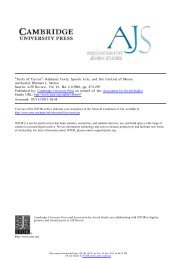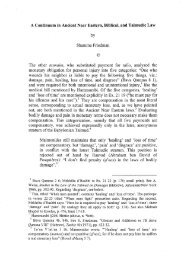Torah in the Mouth.pdf
Torah in the Mouth.pdf
Torah in the Mouth.pdf
Create successful ePaper yourself
Turn your PDF publications into a flip-book with our unique Google optimized e-Paper software.
<strong>Torah</strong> <strong>in</strong> <strong>the</strong> <strong>Mouth</strong>, Writ<strong>in</strong>g and Oral Tradition <strong>in</strong> Palest<strong>in</strong>ian Judaism, 200 BCE - 400 CE<br />
Jaffee, Mart<strong>in</strong> S., Samuel and Al<strong>the</strong>a Stroum Professor of Jewish Studies, University of Wash<strong>in</strong>gton<br />
Pr<strong>in</strong>t publication date: 2001, Published to Oxford Scholarship Onl<strong>in</strong>e: November 2003<br />
Pr<strong>in</strong>t ISBN-13: 978-0-19-514067-5, doi:10.1093/0195140672.001.0001<br />
and <strong>the</strong> Wood Offer<strong>in</strong>g) at which no delegation of nonpriests need be present. These activities serve as fixed terms for <strong>the</strong> list. Rabbi<br />
Aqiva and ben Azzai differ, however, on precisely how <strong>the</strong> qualifiers of <strong>the</strong>se terms are attached (M. Taanit 4:4):<br />
The core issue is at units 2–3 versus 4. Both Rabbi Aqiva and ben Azzai (a student of Rabbi Yehoshua) agree that tradition transmits a<br />
rul<strong>in</strong>g that a certa<strong>in</strong> delegation is abandoned on days <strong>in</strong> which <strong>the</strong> Additional Offer<strong>in</strong>g and <strong>the</strong> Wood Offer<strong>in</strong>g are made. But <strong>the</strong> two Sages<br />
have transposed <strong>the</strong> specific facts of <strong>the</strong> matter. Rabbi Aqiva has memorized <strong>the</strong> pattern:<br />
Additional Offer<strong>in</strong>g—Gate-Clos<strong>in</strong>g<br />
Wood Offer<strong>in</strong>g—Afternoon.<br />
Ben Azzai, by contrast, has preserved <strong>the</strong> order of <strong>the</strong> protases but reversed <strong>the</strong> apodoses:<br />
Additional Offer<strong>in</strong>g—Afternoon<br />
Wood Offer<strong>in</strong>g—Gate-Clos<strong>in</strong>g.<br />
It is unclear from <strong>the</strong> Mishnah whe<strong>the</strong>r Rabbi Aqiva concedes to his colleague on logical grounds or because his memory has been<br />
corrected. His response, never<strong>the</strong>less, is to revise his own version of <strong>the</strong> tradition and to henceforward repeat it <strong>in</strong> Rabbi Yehoshua's<br />
formulation so that <strong>the</strong> correct version might be transmitted.<br />
There are o<strong>the</strong>r passages as well <strong>in</strong> which <strong>the</strong> correction of memory leads to <strong>the</strong> revision of that which is <strong>the</strong>reafter repeated as<br />
tradition. 27 Thus <strong>the</strong> colleagues of Isi <strong>the</strong> Babylonian are portrayed as request<strong>in</strong>g him to recite repeatedly certa<strong>in</strong> traditions<br />
end p.71<br />
1. Every day <strong>in</strong> which Hallel is recited—<strong>the</strong>re is no delegation of witnesses [recit<strong>in</strong>g Scripture] at <strong>the</strong> [time of <strong>the</strong>] Dawn Sacrifice.<br />
2. [And on days requir<strong>in</strong>g] <strong>the</strong> Additional Offer<strong>in</strong>g—<strong>the</strong>re is no [delegation] at <strong>the</strong> Gate-Clos<strong>in</strong>g;<br />
3. [and on days requir<strong>in</strong>g] <strong>the</strong> Wood Offer<strong>in</strong>g—<strong>the</strong>re is no [delegation] at <strong>the</strong> Afternoon Sacrifice: <strong>the</strong> words of Rabbi Aqiva.<br />
4. Said to him ben Azzai: This is how Rabbi Yehoshua would repeat it—<br />
“The Additional Offer<strong>in</strong>g —<br />
<strong>the</strong>re is no [delegation] at <strong>the</strong> Afternoon Service;<br />
<strong>the</strong> Wood Offer<strong>in</strong>g —<br />
<strong>the</strong>re is no [delegation] at <strong>the</strong> Gate-Clos<strong>in</strong>g .”<br />
5. Rabbi Aqiva <strong>the</strong>n began to repeat <strong>in</strong> accord with ben Azzai.<br />
of his teacher <strong>in</strong> order to correct a doubtful teach<strong>in</strong>g that has contam<strong>in</strong>ated <strong>the</strong> tradition (T. Zevahim 2:17). Sages, we f<strong>in</strong>d, could even be<br />
imag<strong>in</strong>ed as requir<strong>in</strong>g <strong>the</strong>ir disciples to rem<strong>in</strong>d <strong>the</strong>m of <strong>the</strong>ir own teach<strong>in</strong>gs. Accord<strong>in</strong>g to M. Ohalot 16:4, a person who has exam<strong>in</strong>ed a<br />
graveyard for contam<strong>in</strong>at<strong>in</strong>g corpse matter and found none rema<strong>in</strong>s <strong>in</strong> a presumption of purity sufficient to enable him to eat food<br />
preserved <strong>in</strong> a state of sanctification. The Tosefta adds a supplementary narrative (T. Ahilut 16:8):<br />
1. Rabban Yohanan ben Zakkai's students asked of him: One who has exam<strong>in</strong>ed—shall he eat [without purification]?<br />
He replied: He doesn't eat.<br />
They said to him: But you taught us that he eats!<br />
He replied: Well said! A th<strong>in</strong>g which my own hands did and my own eyes saw, that I never<strong>the</strong>less forgot—it is all <strong>the</strong> more appropriate<br />
that [I should recall it] now that my ears have heard it!<br />
2. It is not that he didn't know! Ra<strong>the</strong>r he wanted to arouse his students. . . .<br />
3. Rabbi Yehoshua says: One who repeats traditions but does not labor [to master <strong>the</strong>ir content] is like a man who sows but does not<br />
reap; and one who learns torah and forgets is like a woman who gives birth and buries.<br />
4. Rabbi Aqiva says: S<strong>in</strong>g me constantly! S<strong>in</strong>g!<br />
This passage is of remarkable <strong>in</strong>terest for its attitudes toward memorization. First of all, (1) Rabban Yohanan's disciples remember what<br />
he himself, despite his own actions <strong>in</strong> accord with his teach<strong>in</strong>gs, has forgotten. I cannot expla<strong>in</strong> why it would seem plausible that Rabban<br />
Yohanan had forgotten “what his own hands did and his own eyes saw,” but it is significant that <strong>the</strong> appropriate jog to his memory is<br />
hear<strong>in</strong>g his own words repeated to him by his students. We are asked to understand that <strong>the</strong> experience of hear<strong>in</strong>g his own teach<strong>in</strong>g<br />
reported to him sets <strong>in</strong> motion a tra<strong>in</strong> of associations that help him reconstruct <strong>the</strong> experiences upon which his orig<strong>in</strong>al rul<strong>in</strong>g was<br />
PRINTED FROM OXFORD SCHOLARSHIP ONLINE (www.oxfordscholarship.com). (c) Copyright Oxford University Press, 2003 - 2011. All Rights Reserved.<br />
Under <strong>the</strong> terms of <strong>the</strong> licence agreement, an <strong>in</strong>dividual user may pr<strong>in</strong>t out a PDF of a s<strong>in</strong>gle chapter of a monograph <strong>in</strong> OSO for personal use (for details<br />
see http://www.oxfordscholarship.com/oso/public/privacy_policy.html).<br />
Subscriber: Columbia University; date: 20 September 2011

















